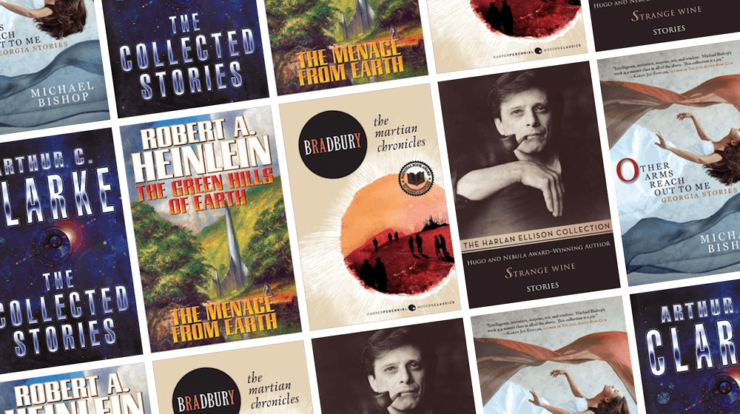Science fiction has a major advantage over the more basic forms of literature, which are designed to provide an opportunity through which we can share emotional and learning experiences with the characters. At their best, standard books and stories remind us of the nature of reality. A writer, however, who can take us to Mars, or allow us to cruise past an exploding star, or show us what our lives might really be like if our friends include artificial intelligences, can show us realities, sometimes of everyday life, sometimes not, but which nonetheless we often take for granted.
Science fiction readers have access to the future, to a range of futures, actually, and also to advanced technology. And we can seriously profit from that capability. Here are five stories, from the heart, about science fiction and everyday life.
I’ve had a passion for space ships since I was four years old, when my father took me to our local movie theater to watch the Buck Rogers and Flash Gordon serials. I’ve also had an intense interest in archeology all my life. I don’t know where it came from, but I suspect it arrived on the day I read Ray Bradbury’s “The Million-Year Picnic,” in which a family living on Mars approach the edge of one of the canals. The kids want to know where the Martians are. Mom and Dad had promised they’d see Martians.
Dad points at the water. “There they are,” he says. The kids look down but see only their own reflections. And then they realize they are the Martians.
After that I was never able to walk away from the glories of lost civilizations.
Arthur Clarke’s “The Star” provided another dead world. But something else came with it: The Jesuit navigator in the starship who discovered the truth about the star of Bethlehem would never, I realized, recover from the impact. I didn’t lose my own faith, of course, but I discovered that I’d been treating it simply as a set of ground rules. And I came to grips with the nature of the shock its loss could deliver.
After reading Robert Heinlein’s “The Green Hills of Earth,” I don’t think I ever connected in the same way with branches waving in the wind and cool breezes and soft moonlight. As Rhysling, the blind poet who wandered the spaceways for a lifetime, put it,
Let me breathe unrationed air again,
Where there’s no lack nor dearth.
I’d never given much value to sleep, nor had I ever thought that death possessed a good side until I read Harlan Ellison’s “The Wine Has Been Left Open Too Long And The Memory Has Gone Flat.” All the races of the universe have sent representatives, a hundred and one thousand of them, to the Sonority Gathering as a result of their Ennui.
They are bored. Everyone is bored. They come in from distant galaxies and local worlds and they are dismally aware that there is nothing left to discover, nothing new to do, no scientific riddles to solve. There is no real point to being alive. And they are immortal. Their health is so good they do not even require sleep.
And that is the ultimate curse.
Michael Bishop delivers “Rattlesnakes and Men.” It’s a tale of a family that, after being hammered by a tornado, moves from Arkansas to Georgia, where they settle in the small town of Nokuse. It’s a pleasant village, with a friendly population. But they do have an unsettling characteristic: Every citizen is required by law to own a rattlesnake. The rattlesnake is primed to protect its owner, and other members of the family, from intruders.
Much of the town’s sense of community arises from the Nokuse Rattlesnake Alliance, which has a long and illustrious history. Annually for fifty years, they’ve hosted Nokuse County’s Rattlesnake Rodeo and Roundup in Wriggly County. And they are part of the community life in every way.
It’s hard to believe people would engage in activities that are inherently dangerous, but we’ve a long history of alcoholism and tobacco, which do kill considerable damage. And for anyone who wishes to stay with animals, there’ve been occasional stories about someone attacked by a pet wildcat.
Science fiction can deliver a unique impact. It can suggest to us why we yearn for the opportunity to sit down and share a pizza with someone from Arcturus; or why we would love to be present for the first performance of Hamlet, with an opportunity to wait outside at the end and inform Will Shakespeare (who played the ghost that opening night) that the show was seriously good; or why we dream about what it would be like to climb out of an airlock and step down onto the surface of another planet.
It reminds us, in many ways, of who we are.
Originally published in April 2018.
 Jack McDevitt is the Nebula Award–winning author of the Academy series and the Alex Benedict series. Along with winning the Nebula Award in 2006, he has also been nominated for a Hugo Award, the Arthur C. Clarke Award, and the Philip K. Dick Award. In 2015 he was awarded the Robert A. Heinlein Award for Lifetime Achievement. His latest work, The Long Sunset, is available from Saga Press. Jack and his wife live near Brunswick, Georgia.
Jack McDevitt is the Nebula Award–winning author of the Academy series and the Alex Benedict series. Along with winning the Nebula Award in 2006, he has also been nominated for a Hugo Award, the Arthur C. Clarke Award, and the Philip K. Dick Award. In 2015 he was awarded the Robert A. Heinlein Award for Lifetime Achievement. His latest work, The Long Sunset, is available from Saga Press. Jack and his wife live near Brunswick, Georgia.










